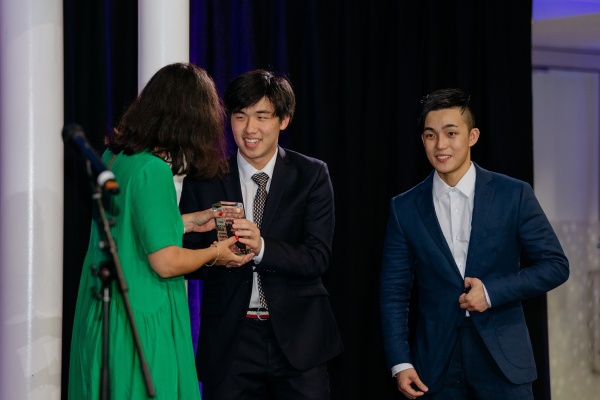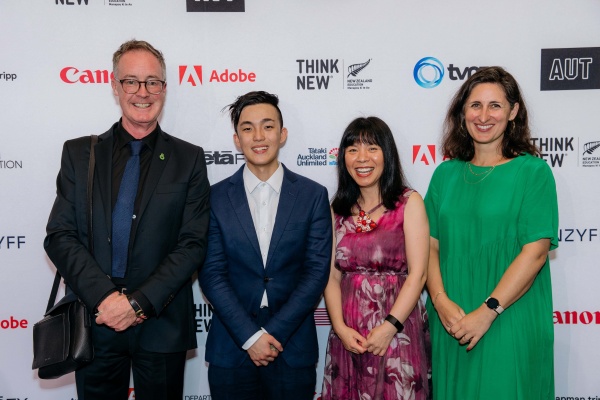Search
Showing 10 of 1803 results for NARSC 2016 July student registration fees
-
INAKL ambassadors welcome
It is an exciting milestone for the INAKL programme, which is a key project for Auckland Tourism, Events and Economic Development – which drives the growth of the international education through its specialist team Study Auckland.
The ambassadors will regularly blog about their experiences as an international student in Auckland on a new site which went live this week.
Ketaki Khare was among the ambassadors who were formally announced by Auckland Mayor Len Brown at an international student function held at Auckland Zoo last month.
As well as being a student ambassador, Ketaki is among 10 Indian students awarded the New Zealand Prime Minister’s Sports Scholarships for 2015. She is a member of the Indian women’s rugby team, is India’s first female rugby referee and the first Indian woman to pursue a professional career in rugby.
Ketaki Khare says: “Being an INAKL International Student Ambassador is an amazing opportunity to view this magical city in all its glory and it gives me immense pleasure to be able to write about all my experiences.”
Birgit Hermann, Project Manager – International Student Experience, says: “The ambassadors’ role is to experience everything Auckland has to offer and talk about them to international students who are here or may come here.”
The event at Auckland Zoo was the second in a series of INAKL events organised by Study Auckland for the region’s international student community. Some international students also enjoyed an INAKL group attendance at an Auckland Blues rugby game last month, and a recent Immigration New Zealand seminar about how they could potentially make Auckland their permanent home.
The programme kicked off with the resoundingly successful International Student Welcome held at The Cloud in March, which attracted about 2,400 students.
“The recent immigration seminar was fully subscribed within 10 hours and the INAKL Facebook site reached more than 2000 likes this week. The programme is achieving great results, but we would like to see it continue to grow and benefit students,” says Birgit.
For further information please visit aucklandnz.com/inakl or contact inakl@aucklandnz.com.
-
Letter from the CE on India student market
India is and will continue to be a large part of the international education industry. The vast majority of Indian students who study in New Zealand make a very valuable contribution to our campuses, our workplaces and our society. Every day Indian students, alongside other international students, are helping New Zealand to build its research capability and global linkages, to fill skill shortages and to enrich New Zealand culture.
However, we do currently have a small number of students from India facing potential deportation because of issues with their visa, or with illegal behaviour while they have been in New Zealand. Separately, students affected by the recent sale of an Auckland private training provider are being supported to transfer to a new provider to continue and complete their studies.
There have also been disturbing stories about some cases of the exploitation of international students from employers and others.
New Zealand government agencies are working closely together on these issues, to ensure all students are treated fairly and are well cared for, and to protect New Zealand’s educational reputation. This joint-agency work on international student wellbeing has focused in recent months on Auckland where the majority of international students are located, and involved a range of community meetings and student focus groups to ensure student needs and concerns are being heard and addressed.
It is vital that New Zealand maintains high standards across the international education industry.
It is also important that these events do not tarnish the reputation of an entire community nor devalue the significant contribution that international students from India and elsewhere, and our education providers, make to New Zealand.
To all of us involved in international education, it is a timely reminder to honour our obligations and responsibilities to students. We all – providers, agents, employers, community and ethnic groups, government agencies and other support services – have a role to play in a successful international student experience.
When I talk about shared responsibilities, I am talking about government agencies which set the regulatory frameworks (including setting rules around proof of financial means), and agencies like Education New Zealand which promote New Zealand’s education opportunity offshore. I am also talking about providers which offer students – domestic and international – a wide variety of education programmes. These programmes can act as a stepping stone to further study in New Zealand or overseas. They can also provide a pathway to residence if a student gains the skills that are in demand in New Zealand. At other times, they are very much about the overseas experience.
Education agents and students also have a responsibility for great student experiences. There has been a lot of communication about the obligation on New Zealand providers to manage their agent relationships. Information sharing on agent performance is a key part of Immigration New Zealand’s strategy to support providers’ decisions on the agents they work with. Providers can expect to see greater government engagement on this area of compliance with the new Code of Pastoral Care.
We also have a collective responsibility to share and promote the positive contribution that international education makes to our communities.
We believe that students too have an obligation to come here with genuine intent – that their primary purpose is to study and that they have the means to do so. Working in New Zealand while studying is a way to complement the classroom skills they learn and to really engage with everyday life. It is not intended as a lifeline to cover living costs which can expose vulnerable students to the risk of exploitation.
Of course, New Zealand employers are important contributors to the education experience as well. Everyone in New Zealand has the right to protection through minimum work rights, and we expect employers to uphold New Zealand employment law. We continue to encourage individuals to come forward if they have specific examples of workplace mistreatment. This is the only way we can address these issues.
We are also working alongside the New Zealand communities of international students because we see this as crucial to good outcomes. It helps to bridge the gap that may exist through the different cultural contexts which operate and where, for example, some international students aren’t aware of their rights and protections under New Zealand law.
Of the students and former students facing deportation, some are in New Zealand unlawfully, some have been found to have submitted fraudulent visa applications, and some have committed crimes here. It’s critical that only those who have the right to be in New Zealand remain. This helps to support a quality system for the majority of international students who have, and continue to come here with, genuine means and intent.
Lastly, we acknowledge the role of education providers in this process – we do not accept poor performance. For the hundreds delivering high-quality education programmes in New Zealand, the outcomes for international students are obvious. Education New Zealand has numerous student stories of success. For the small number of providers not performing, agencies are taking appropriate action, not all of which makes it into the public arena, and for good reason. But I can say that agencies are working together more closely than before, sharing information to support change where it’s needed and to continuously improve the New Zealand education experience.
International education is one of the most powerful ways to connect us across the world. Let’s all continue to take responsibility for our part in it.

Grant McPherson
Chief Executive, Education New Zealand
-
International student employment: overcoming barriers
The panel, chaired by ENZ’s Director Student Experience, Hayley Shields, featured a diverse and informed range of views from
- Brett Berquist, Director International at the University of Auckland
- Dr Cate Gribble, Senior Research Analyst at the University of Auckland
- James Koo, former international student and founder and CEO of Niesh, a free student discounts app
- Paul Hickey, Managing Director at SpeakData
- Charan Mohan, former international student and now Business Intelligence Analyst at SpeakData.
Dr Cate Gribble talked about the need to raise awareness of the benefits to businesses of employing international students to counter employer concerns around the challenges of international student employees, including perceptions they won’t fit culturally, their English will be limited or that their visa situation will make paperwork too challenging. Students also find their international work experience in their home country is not always valued here, and employers often require New Zealand citizens or Permanent Residents.
Brett Berquist added that we need to counter the perception that international students will not stick around.
“The reality is that all students, both domestic and international, are equally mobile. Employers need to stop thinking Kiwis make employees for life, and that international students are a flight risk.”
James Koo said the lack of transparency around these concerns is a challenge for international students. As a result, many international students end up sending a generic CV and cover letter to any and all available jobs, too discouraged to spend time tailoring their CVs to each role.
James also noted that student expectations can sometimes be unrealistic, and some students expect to work in large, prestigious companies whereas most New Zealand companies are SMEs – which he noted can actually offer more opportunities and experiences for students and recent graduates.
SpeakData’s Paul Hickey then talked about his experience hiring international students, such as fellow panellist Charan Mohan. While Charan clearly had the hard skills required for his company, Paul needed to be convinced of his soft skills, which he calls being ‘Kiwi-ready.’
 “Often, international students come into interviews and talk solely about their studies and qualifications when actually, we’re just as interested in hearing about their interests outside of work.
“Often, international students come into interviews and talk solely about their studies and qualifications when actually, we’re just as interested in hearing about their interests outside of work.“That social aspect plays a big part – sharing a story about kayaking in Taupo at the weekend or going to an All Blacks game is an easy way to connect with Kiwi employers.”
Paul also talked about the need to work with institutions to create a pipeline of talent.
“Employers often take a short-term view and hire people ‘just in time’ rather than looking ahead, whereas if you expect to have 10 new positions available in two years’ time, why not try to establish a pipeline for talent through local institutions who can connect you with new graduates with relevant skills?”
Panellists also agreed that having internships and work experience in education programmes will also help international students get into the job market when they graduate.
Brett concluded that while all these approaches can reduce barriers, ultimately, a strategy is required – supported by data that is already available in reports such as the Ministry of Education’s ‘Moving Places’, ENZ’s Beyond the Economic and Immigration New Zealand data.
It is an ongoing discussion that will continue to be in the spotlight in New Zealand as the industry works to meet international student expectations of global employability.
-
Student visa processing update
A very large number of applications have been submitted to INZ in January for courses beginning within four weeks of the application submission date.
Jeannie Melville, INZ’s Assistant General Manager, Visa Services reminds applicants to apply for their student visa at least eight weeks before their course start date.
“For those with an application in progress, we ask that they first check the recent student visa processing times published on the INZ website before contacting INZ to seek an update on their application. Those who submitted their visa application online should also check their online account regularly to ensure they haven’t missed any communications from INZ. If INZ needs more information to decide an application, it will take longer to assess.”
During this peak student visa application period, INZ is processing applications in some additional sites in an effort to ensure applications are decided as quickly as possible.
To ensure the sector is well informed, INZ is developing improved reporting on application processing, including the volume of work in progress and expected processing times. INZ will provide this information in regular email updates to education peak bodies.
ENZ is working closely with INZ on student visa processing matters, to help providers, students and agents understand the current situation. While INZ continues to experience high volumes of student visa applications, ENZ continues to monitor market reactions and engage constructively with INZ.
Current fee paying student visa application volumes (as at 27 January 2019)
Status
Application volumes
Assessment ongoing
7430
Approved in principle
1109
Total on hand
8539
Recent processing timeframes (calculated based on fee paying student visa applications decided 28 Oct 2018-28 Jan 2019)
Provider Type
80% decided within:
90% decided within:
Institutes of Technology and Polytechnics
38 days
50 days
Private Training Establishments
36 days
47 days
Schools
15 days
25 days
Universities
21 days
31 days
-
COVID-19: How ENZ is communicating to students, agents and providers
On our own channels, ENZ’s communications with students are focused on the following streams of work:
- Keeping students updated with official government information about the COVID-19 situation in New Zealand, and how this affects them
- Supporting international students who are in New Zealand through this difficult time, with content to keep them connected and support their wellbeing.
- Keeping New Zealand top of mind for prospective students and providing information about studying here, so we are well positioned to recruit new students when the crisis period is over and borders reopen.
Agents are a key audience for ENZ, as they are often a student’s first port of call when an issue comes up. Since February 2020, AgentLab has been our primary information channel for communicating with agents updates on COVID-19. The platform has 2,697 users, and has seen a surge in registrations (733 new) in the past three weeks alone.
We recognise that New Zealand education providers are also communicating with their international students regularly. ENZ hosts a dedicated COVID-19 page for education institutions and stakeholders, and has developed messaging for international students at both a tertiary and secondary school level that providers should feel free to recut for their own channels.
Finally, ENZ is communicating regularly with institutions and peak bodies through regular meetings and email updates.
What we’re doing on our student web platforms
NauMai NZ is our central information for hub for international students in New Zealand. Here, students can find out how to access healthcare, open a bank account, find a rental property, and more.
Since February, NauMai NZ has hosted a dedicated COVID-19 page that is regularly updated with key information relevant to international students.
Beyond immediate information updates, our content focus on NauMai NZ for the next few months will be on creating new content to support international students throughout their time in self-isolation and beyond. Wellbeing will be a key theme, as well as helping students stay connected through sharing their stories.
NauMai NZ COVID-19 information page
The Study in New Zealand website has a banner at the top and midway down the page that directs to the NauMai NZ COVID-19 info page.
Tohu the chatbot is available (who lives on the Study in New Zealand website, NauMai NZ and on Facebook Messenger) to answer a number of COVID-19 related queries.
What we’re doing on student-facing social media
Our strategy for our student social media pages is first and foremost to ensure COVID-19 information is easy to find for anyone who visits our social pages. Across our student-facing Facebook, Instagram, Twitter, Facebook Group and Weibo pages, we have ‘pinned’ informative posts and links directing to the NauMai NZ COVID-19 page, for up-to-date, relevant information. On WeChat, we have a site tab with regular updated COVID-19 information.
Over the coming weeks and months, our social media content will also focus primarily on supporting the wellbeing of current international students. We’ll be working with our Kiwi Ambassadors and other students to share their stories, experiences and tips, helping to keep students connected with each other.
Student emails
Most of the emails our marketing team sends out to students and prospective students are automated well in advance. It was therefore important for ENZ to review all of our emails to ensure they are relevant in the current national and international environment.
- We have paused all of our automated emails except enquiry emails that link prospective students through to institutions they are interested in.
- We have emailed our current student and prospective student databases to acknowledge the situation and link them through to the NauMai NZ COVID-19 page.
- Our key message here was that the safety and wellbeing of international students in New Zealand and New Zealand students who are overseas is our top priority at this time, and we look forward to welcoming new international students when borders reopen, and life starts getting back to normal.
- We will be considering our ongoing automated email stream options over the coming weeks, and re-assessing any necessary content changes.
-
Creative rangatahi showcased at the New Zealand Youth Film Festival
Seventeen-year-old Jaeyun Han, an international student at Newlands College, Wellington, bagged the award for Best International Student Film. Han, from Korea, won the award for his film ‘Him’ - a dark tale of jealousy, obsession, and unrequited love.
Education New Zealand Manapou ki te Ao (ENZ) sponsored the Best International Student Film category of the awards, with ENZ General Manager Sector Services Sahinde Pala presenting the winner’s award.

Sahinde Pala presenting the award to Jaeyun Han with festival founder Ryan Chow looking on
“We warmly congratulate Jaeyun.
“ENZ is pleased to support the International Student Film award and the film festival for the wonderful platform they offer young people to share their stories and collaborate. The festival is a great way to showcase what New Zealand offers as a film and creative study destination, and ultimately helps grow connections between international students and New Zealanders,” Sahinde said.
“I was blown away by the talent of all the students involved, they will have bright careers if they choose to enter the film industry. Jaeyun’s storyline, coupled with sophisticated editing and camerawork, made for a gripping and unforgettable film.”

The winning Best International Student Film ‘Him’ being shown at the award ceremony
Jaeyun was one of three final nominees, all of whom were invited to an industry experience day exploring TVNZ, Department of Post and AUT last week, ahead of the awards.
The competition was judged by leaders in the industry. Marvel Studios Director of Technology Katie Hinsen, Weta Digital Visual Effects Associate Producer Jeremy Hollis, and Professor Welby Ings from AUT made the final decisions.

Judges Jeremy Hollis and Katie Hinsen congratulating Jaeyun Han alongside Sahinde Pala and Ryan Chow
“A teacher at school encouraged me to enter the festival and I didn’t think I had a chance of winning. This is such a surprise and an honour,” Jaeyun said.
He received a $500 cash prize and mentorship session with New Zealand cinematographer Phillip A.T Smith, who has worked on notable films such as ‘Mad Max Fury Road’, ‘Dune’ and ‘District 9’.

From left to right: ENZ Student Experience Manager Ross Crosson, festival founder Ryan Chow, Senior Advisor Student Experience Faymie Li and Sahinde Pala
NZYFF is founded by Ryan Chow, an international student from Canada studying towards a Bachelor of Business and a Bachelor of Communications Studies at Auckland University of Technology (AUT).
Ryan is passionate about providing an opportunity for youth to have their work celebrated and connecting them with industry professionals to kick-start their careers, which is how NZYFF came to be founded.
Jaeyun’s film is available to view here, and the other nominated films are available to view on the NZYFF website here.

Trophies presented to the category winners
-
Update from Immigration New Zealand
Peak processing season in full swing
Immigration New Zealand (INZ) has seen an increase in applications submitted during September 2024, ahead of the 1 October visa fee and levy increase and because of our ‘apply early’ messaging.
In September 2023, approximately 3,104 international student visa applications were submitted and in September 2024, approximately 6,893 international student visa applications have been submitted, an increase of 122%.
Now that we are in our peak processing period, we expect these processing times to grow as we receive a higher volume of applications. Students should get their visa application in at least 3 months before they plan to travel to New Zealand for the first semester of 2025.
By now, most students should have received an offer of place from their chosen education provider. Anyone expecting to study in the first term of 2025 should apply now.
We acknowledge that some students who are waiting on key study documentation are unable to apply 3 months ahead. In these cases, they should apply as soon as they have all of their documents, but they need to be aware that late applications may not be processed in time for them to start studying.
Immigration New Zealand has three student processing sites in New Zealand, and has allocated more staff to processing student visas, compared to last year’s peak.
Ensure you submit a complete applicationTo avoid delays, we encourage students, agents and advisers to follow the advice in our student visa information sheets. If they do not include all the required documents when they submit their application, it may be declined.
Applications that have a statement of purpose letter written by the student, telling us about their personal circumstances and plans in New Zealand, help us assess their intent. If a student intends to apply for another visa after study, they should declare this. Students are allowed to apply for another visa after they finish studying.
-
International Student Barometer Results: school sector
The results of the International Student Barometer (ISB) survey for the school sector are now in, and New Zealand has maintained very high overall student satisfaction.
ENZ commissioned the ISB survey of students at schools to investigate the decision-making, expectations, perceptions and experiences of over 2,000 international students aged 16+.
Unlike the surveys of the other sectors, there is no global benchmark, because New Zealand is the only country which undertakes the ISB survey in the school sector. However, we can compare ourselves with our own performance in 2012, which was also very high.
Ninety-four percent of school students surveyed were satisfied with their experience. This is on par with the 2012 survey. Students showing the highest satisfaction level were from France, Hong Kong, Germany, and Brazil.
This is a great result for the NZ school sector – maintaining high satisfaction levels, while growing student numbers.
Eighty-eight percent are happy with their life in New Zealand. Three out of four students would recommend their school to other students thinking of studying there.
It’s worth noting that overall satisfaction levels vary noticeably by institution and by nationality. Most participating institutions have received their own results to analyse and help inform the development of services and support for their student cohorts.
Generally speaking, the areas with lowest student satisfaction are around making friends with locals, and some aspects of arrival support – elements of which are issues for international students globally, not just in New Zealand.
Education New Zealand will be using this data to identify follow-up actions and deliver professional development support to schools.
One particular point to note is that, of those students who plan to stay in New Zealand after school (26 percent), two thirds intend to go to university. And, 26 percent of all students don’t yet know what they will do post-school – an opportunity for local tertiary providers.
A point of comparison is Australia’s International Student Survey 2014, in which 82 percent of school students were satisfied with their overall experience.
More in-depth results of the New Zealand survey are available in the ISB School Sector Summary Report 2015 and the ISB School Sector Presentation.
-
International students affected by bank changes
As a result of the Global Tax Information Reporting and Anti Money Laundering campaign, all banks in New Zealand, as well as other financial institutions, are required by law to collect additional information from a foreign tax resident before they can open an account in New Zealand. As part of these changes, banks also require a certified copy of (or, in some cases, the original) the student’s passport (bio-page) and proof of current residential address. Those who apply to open a bank account while outside New Zealand will be required to provide proof of their current overseas residential address, and to present themselves at the bank to activate the account when they arrive in New Zealand.
The same changes are being implemented in other countries that are part of this global initiative.
These changes also apply to international students who intend to use INZ’s Funds Transfer Scheme (FTS) to transfer their funds to New Zealand. Note the FTS is only available to international students from certain countries.
FTS information
If applying for an account under the FTS in the near future, ANZ, the New Zealand bank that operates the FTS, may contact the student to complete additional forms to ensure they capture the additional information they require. These forms include questions around the student's tax information, and the student themselves will need to complete and sign these forms (not their agent).
For FTS accounts only, acceptable proof of residential address includes:
- utility bill (e.g. landline telephone and power only)
- rates bill (e.g. property tax document)
- tax certificate
- insurance policy document
The document(s) listed above must be less than three months old and must state the student's name and their residential address. Where the student is living with their parents and the document states their parents' name(s), a parent whose name appears on the document must provide a letter stating that the student lives with them.
Note there may be some delays visa application processing while Immigration New Zealand and ANZ work through these changes.
-
Around the world in five
CANADA
Faster student visa processing for four Asian countries
Canada has launched a Student Direct Stream to make visa processing times faster for eligible students from China, India, Vietnam and the Philippines.
GLOBAL
Let them talk: The power of student reviews
Candid student reviews of study destinations and institutions have a profound impact on prospect engagement, search optimisation, and the overall effectiveness of the recruitment marketing effort.
US
Soft power declines as number of international students shrinks
The decline in international students studying in the US may mean a decline in the US’s soft power, according to two researchers at the University of Pittsburgh.
SOUTH EAST ASIA
Ed-tech start-up raises $8.5 million from Malaysian investors
An education technology start-up has raised $8.5 million as it aims to keep building its platform for hosting massive open online courses. The business has seven Australian universities and 30 Malaysian universities as customers.
UK
UK relaxes visa rules for students from 11 ‘low-risk’ countries
The UK Home Office has announced a revised immigration policy, no longer requiring student applicants from 11 countries to show proof for educational, financial and English requirements. The revised list does not include India, which The National Indian Students and Alumni Union UK has called unfair.

